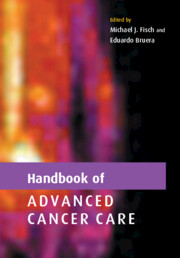Book contents
- Frontmatter
- Contents
- List of contributors
- Preface
- Acknowledgements
- PART I General concepts in oncology
- 1 Principles of diagnosis and staging
- 2 Principles of palliative chemotherapy
- 3 Principles of palliative surgery
- 4 Radiotherapy for palliation of symptoms
- 5 ABCs of clinical trials
- 6 Principles of cancer rehabilitation
- 7 Principles of palliative nursing
- 8 Ethics of decision making towards the end of life
- 9 Breaking bad news
- 10 The use of complementary/alternative medicine
- 11 Understanding “hospice”
- 12 Practical aspects of home care
- 13 Cultural differences in advanced cancer care
- 14 Implementing social services
- 15 Pastoral care
- 16 Bereavement
- Part II Primary tumors
- Part III Management of specific symptoms and syndromes
- Index
- References
6 - Principles of cancer rehabilitation
Published online by Cambridge University Press: 04 August 2010
- Frontmatter
- Contents
- List of contributors
- Preface
- Acknowledgements
- PART I General concepts in oncology
- 1 Principles of diagnosis and staging
- 2 Principles of palliative chemotherapy
- 3 Principles of palliative surgery
- 4 Radiotherapy for palliation of symptoms
- 5 ABCs of clinical trials
- 6 Principles of cancer rehabilitation
- 7 Principles of palliative nursing
- 8 Ethics of decision making towards the end of life
- 9 Breaking bad news
- 10 The use of complementary/alternative medicine
- 11 Understanding “hospice”
- 12 Practical aspects of home care
- 13 Cultural differences in advanced cancer care
- 14 Implementing social services
- 15 Pastoral care
- 16 Bereavement
- Part II Primary tumors
- Part III Management of specific symptoms and syndromes
- Index
- References
Summary
Principles of cancer rehabilitation
An impairment is the result of a loss of physiologic structure or function. These are the clinical features or manifestations of a disease. Examples may be weakness or confusion from a brain tumor.
A disability is the lack of ability to perform a task or activity within the normal range. This is the functional consequence of an impairment. An example may be the inability to walk from the weakness resulting from a brain tumor.
A handicap occurs when the interaction of a person with their environment leads to a disadvantage in performing a role otherwise normal for an individual. An example would be the inability to continue work as a mail carrier due to inability to walk from a brain tumor.
Cancer and its treatments often result in deficits in mobility, self-care, or cognition, which can lead to impairment, disability, or handicap.
Cancer rehabilitation strives to minimize disability from the impairments of cancer by maximizing patient function and quality of life.
Quality of life is defined by each individual but usually includes a sense of dignity. Dignity may simply be using a commode rather than a bedpan, being able to dress oneself, or being able to get from bed to chair with little assistance. Cancer rehabilitation attempts to make patients into people again by preserving respect and dignity.
Lehmann et al. in 1978 identified multiple problems in the cancer patient population, which could be improved by rehabilitation measures (Table 6.1).
- Type
- Chapter
- Information
- Handbook of Advanced Cancer Care , pp. 45 - 50Publisher: Cambridge University PressPrint publication year: 2003

